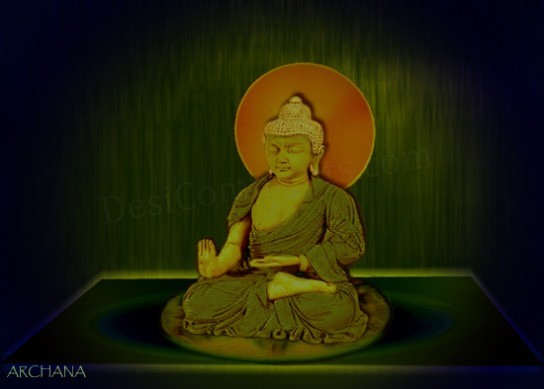மற்றும்
பன்னிரண்டாகவுள்ள மண்டலங்கள்
சுருக்கமான வரலாற்று முன் வரலாறு
ஸுத்தபிடக
புத்தசமய நெறி முறைகளின் பன்னிரண்டாகவுள்ள மண்டலங்கள்
புத்தசமய நெறி முறைகளின் ஒன்பது மண்டலங்கள்
TIPITAKA-ஸுத்தபிடக-போதிசத்தா மேன்மை பொருந்திய நேர்த்தி வாய்ந்த மனிதர் ஸுத்த நீதி வாக்கியம்
- விழிப்புணர்வு மேல் ஆஜரா கிருத்தல் -
( மஹா+ ஸதிபத்தான)-Mahāsatipaṭṭhāna Sutta-
Iமெய்யார்வ தியானம்-IV. சட்டத்துக்கு அடிப்படையான அற முறைகளின் கூர்ந்த கவனிப்பு-C. புலனுணர்வு கோளங்கள் மீதான பிரிவு (Āyatana Pabba ஆயதன பப்பா)-Section on the Sense Spheres
from FREE ONLINE eNālāndā Research and
Practice UNIVERSITY through http://sarvajan.ambedkar.org

IV. சட்டத்துக்கு அடிப்படையான அற முறைகளின் கூர்ந்த கவனிப்பு
C. புலனுணர்வு கோளங்கள் மீதான பிரிவு (Āyatana Pabba ஆயதன பப்பா)
மற்றும்
அதற்கு அப்பால், எவ்வாறு பிக்குக்களுக்களே, ஒரு பிக்கு, dhammas in
dhammas சட்டத்துக்கு அடிப்படையான அற முறைகளில் சட்டத்துக்கு அடிப்படையான
அற முறைகளூடன் ஆறு Āyatana Pabba ஆயதன பப்பா புலனுணர்வு கோளங்களூடன்
கூர்ந்த கவனிப்புடன் வாசம் செய்கிரார்?
இங்கு, பிக்குக்களுக்களே, ஒரு பிக்கு, அங்கே cakkhu கண்களை புரிந்து
கொள்கிரார்,rūpa ரூபம்/சடப்பொருளை புரிந்து கொள்கிரார், இவ்விரண்டு
காரணைங்களை நோக்கி எழும் saṃyojana கால்விலங்கு/பற்றாசை
புரிந்து
கொள்கிரார்; எவ்வாறு saṃyojana கால்விலங்கு/பற்றாசை என அவர் புரிந்து
கொள்கிரார்; எவ்வாறு கைவிடப்பட்டsaṃyojana கால்விலங்கு/பற்றாசை
எதிர்காலத்தில் அணுகாது என அவர் புரிந்து கொள்கிரார்.
காதுகளை புரிந்து கொள்கிரார்,sadda புரிந்து கொள்கிரார், இவ்விரண்டு
காரணைங்களை நோக்கி எழும் saṃyojana கால்விலங்கு/பற்றாசை புரிந்து
கொள்கிரார்; எவ்வாறு saṃyojana கால்விலங்கு/பற்றாசை என அவர் புரிந்து
கொள்கிரார்; எவ்வாறு கைவிடப்பட்டsaṃyojana கால்விலங்கு/பற்றாசை
எதிர்காலத்தில் அணுகாது என அவர் புரிந்து கொள்கிரார்.
மூக்கை புரிந்து கொள்கிரார்,gandha புரிந்து கொள்கிரார், இவ்விரண்டு
காரணைங்களை நோக்கி எழும் saṃyojana கால்விலங்கு/பற்றாசை புரிந்து
கொள்கிரார்; எவ்வாறு saṃyojana கால்விலங்கு/பற்றாசை என அவர் புரிந்து
கொள்கிரார்; எவ்வாறு கைவிடப்பட்டsaṃyojana கால்விலங்கு/பற்றாசை
எதிர்காலத்தில் அணுகாது என அவர் புரிந்து கொள்கிரார்.
நாக்கை புரிந்து கொள்கிரார், rasa ருசியை புரிந்து கொள்கிரார், இவ்விரண்டு
காரணைங்களை நோக்கி எழும் saṃyojana கால்விலங்கு/பற்றாசை புரிந்து
கொள்கிரார்; எவ்வாறு saṃyojana கால்விலங்கு/பற்றாசை என அவர் புரிந்து
கொள்கிரார்; எவ்வாறு கைவிடப்பட்டsaṃyojana கால்விலங்கு/பற்றாசை
எதிர்காலத்தில் அணுகாது என அவர் புரிந்து கொள்கிரார்.
உணர்வுகளை புரிந்து கொள்கிரார், இவ்விரண்டு காரணைங்களை நோக்கி எழும்
saṃyojana கால்விலங்கு/பற்றாசை புரிந்து கொள்கிரார்; எவ்வாறு saṃyojana
கால்விலங்கு/பற்றாசை என அவர் புரிந்து கொள்கிரார்; எவ்வாறு
கைவிடப்பட்டsaṃyojana கால்விலங்கு/பற்றாசை எதிர்காலத்தில் அணுகாது என அவர்
புரிந்து கொள்கிரார்.
மனதை புரிந்து கொள்கிரார், dhammas தம்மங்களை புரிந்து கொள்கிரார்,
இவ்விரண்டு காரணைங்களை நோக்கி எழும் saṃyojana கால்விலங்கு/பற்றாசை
புரிந்து கொள்கிரார்; எவ்வாறு saṃyojana கால்விலங்கு/பற்றாசை என அவர்
புரிந்து கொள்கிரார்; எவ்வாறு கைவிடப்பட்டsaṃyojana கால்விலங்கு/பற்றாசை
எதிர்காலத்தில் அணுகாது என அவர் புரிந்து கொள்கிரார்.
இவ்வாறு அவர் dhammas சட்டத்துக்கு அடிப்படையான அற முறைகளில் சட்டத்துக்கு அடிப்படையான அற முறைகளூடன்
கூர்ந்து
கவனித்து வாசம் செய்கிரார், அல்லது சட்டத்துக்கு அடிப்படையான அற
முறைகளில் சட்டத்துக்கு அடிப்படையான அற முறைகளூடன் வெளியே கூர்ந்த
கவனித்து வாசம் செய்கிரார்;samudaya of phenomena புலன்களால் உணரத்தக்க
தோற்றம் அதனுடைய அகநிலையில் கூர்ந்து கவனித்து வாசம் செய்கிரார்,
புலன்களால் உணரத்தக்க கழிதல் அதனுடைய அகநிலையில் கூர்ந்து கவனித்து வாசம்
செய்கிரார், samudaya and passing away of phenomena புலன்களால் உணரத்தக்க
தோற்றம் மற்றும் கழிதல் அதனுடைய அகநிலையில் கூர்ந்து கவனித்து வாசம்
செய்கிரார், இல்லாவிடில் “இது dhammas சட்டத்துக்கு அடிப்படையான அற
முறைகளில் சட்டத்துக்கு அடிப்படையான அற முறைகளூடன் ” என உணர்ந்து, sati
விழிப்பு நிலை அவருக்குள் வந்திருக்கிறது, சும்மா வெறும் ñāṇa ஓர்அளவு
ஞானம் மற்றும் ஓர்அளவு paṭissati என எண்ணி பற்றறு வாசம் செய்கிரார்.
மற்றும் உலகத்தில் சிறிதளவாவது பற்றிக்கொள்ளாது,அவ்வாறாக பிக்குக்களுக்களே,
ஒரு பிக்கு, dhammas சட்டத்துக்கு அடிப்படையான அற முறைகளில் சட்டத்துக்கு
அடிப்படையான அற முறைகளூடன் ஆறு Āyatana Pabba ஆயதன பப்பா புலனுணர்வு
கோளங்களூடன் கூர்ந்த கவனிப்புடன் வாசம் செய்கிரார்.
IV. தம்மானுபஸ்ஸனா
B.கந்த பப்ப
C. ஆயத்தன பப்ப
புன ச பரங், பிக்காவெ பிக்கு தம்மேஸு தம்மானுபஸ்ஸி விஹாரதி, சஸு அஜ்ஜத்திக-பாஹிரெஸு ஆயதனேஸு. கதங் ச பன, பிக்காவெ பிக்கு தம்மேஸு தம்மானுபஸ்ஸி விஹாரதி, சஸு அஜ்ஜத்திக-பாஹிரெஸு ஆயதனேஸு?
இத, பிக்காவெ பிக்கு சக்குங் ச பஜானதி, ரூபெ சக்குங் ச பஜானதி, யங் ச தத்.துபயங் பத்திச்ச உப்பஜ்ஜதி சம்யொஜனங் தங் ச பஜானதி, யத ச அன்.உப்பன்னஸ்ஸ ஸம்யொஜனஸ்ஸ உப்பாத்தொ ஹோதி தங் ச பஜானதி, யத ச உப்பன்னஸ்ஸ ஸம்யொஜனஸ்ஸ உப்பாத்தொ ஹோதி தங் ச பஜானதி, யத ச பஹினஸ்ஸ ஸம்யொஜனஸ்ஸ ஆயதிங் அன்.னுபாதொ ஹோதி தங் ச பஜானதி.
ஸொதங் ச பஜானதி, ஸத்தெ ச பஜானதி, ச பஜானதி, யங் ச தத்.துபயங் பத்திச்ச உப்பஜ்ஜதி சம்யொஜனங் தங் ச பஜானதி, யத ச உப்பன்னஸ்ஸ ஸம்யொஜனஸ்ஸ உப்பாத்தொ ஹோதி தங் ச பஜானதி, யத ச பஹினஸ்ஸ ஸம்யொஜனஸ்ஸ ஆயதிங் அன்.னுபாதொ ஹோதி தங் ச பஜானதி.
கானங் ச பஜானதி, கந்தெ ச பஜானதி, யங் ச தத்.துபயங் பத்திச்ச உப்பஜ்ஜதி சம்யொஜனங் தங் ச
பஜானதி, யத ச உப்பன்னஸ்ஸ ஸம்யொஜனஸ்ஸ உப்பாத்தொ ஹோதி தங் ச பஜானதி, யத ச
பஹினஸ்ஸ ஸம்யொஜனஸ்ஸ ஆயதிங் அன்.னுபாதொ ஹோதி தங் ச பஜானதி.
ஜிவ்ஹங் ச பஜானதி, ரஸெ ச பஜானதி, யங் ச தத்.துபயங் பத்திச்ச உப்பஜ்ஜதி சம்யொஜனங் தங் ச
பஜானதி, யத ச உப்பன்னஸ்ஸ ஸம்யொஜனஸ்ஸ உப்பாத்தொ ஹோதி தங் ச பஜானதி, யத ச
பஹினஸ்ஸ ஸம்யொஜனஸ்ஸ ஆயதிங் அன்.னுபாதொ ஹோதி தங் ச பஜானதி.
காயங் ச பஜானதி, பொத்தப்பெ ச பஜானதி, யங் ச தத்.துபயங் பத்திச்ச உப்பஜ்ஜதி சம்யொஜனங் தங் ச
பஜானதி, யத ச உப்பன்னஸ்ஸ ஸம்யொஜனஸ்ஸ உப்பாத்தொ ஹோதி தங் ச பஜானதி, யத ச
பஹினஸ்ஸ ஸம்யொஜனஸ்ஸ ஆயதிங் அன்.னுபாதொ ஹோதி தங் ச பஜானதி.
மனங் ச பஜானதி, தம்மெ ச பஜானதி, யங் ச தத்.துபயங் பத்திச்ச உப்பஜ்ஜதி சம்யொஜனங் தங் ச
பஜானதி, யத ச உப்பன்னஸ்ஸ ஸம்யொஜனஸ்ஸ உப்பாத்தொ ஹோதி தங் ச பஜானதி, யத ச
பஹினஸ்ஸ ஸம்யொஜனஸ்ஸ ஆயதிங் அன்.னுபாதொ ஹோதி தங் ச பஜானதி.
இதி அஜ்ஜதங் வ தம்மேஸு தம்மானுபஸ்ஸி விஹாரதி, பஹித்தா வ தம்மேஸு தம்மானுபஸ்ஸி விஹாரதி, அஜ்ஜத-பஹித்தா வ தம்மேஸு தம்மானுபஸ்ஸி விஹாரதி; ஸமுதய-தம்மானுபஸ்ஸி வ தம்மேஸு விஹாரதி, ‘அதி தம்மா’தி வ பன்’னஸ்ஸ ஸதி பச்சுபச்சித்தா ஹோதி, யாவ தேவ ஞான.மத்தாய பத்திஸத்தி.மத்தாய. அனிஸிதொ ச விஹாரதி, ந ச கின்சி லோகெ உபாதியத்தி. ஏவங் பி கொ, பிக்காவெ பிக்கு தம்மேஸு தம்மானுபஸ்ஸி விஹாரதி, சஸு அஜ்ஜத்திக-பாஹிரெஸு ஆயதனேஸு.
IV. Dhammānupassanā
B. Khandha Pabba
And furthermore, bhikkhus, a bhikkhu dwells observing dhammas in dhammas(Name of the first book of the Abhidhamma piṭaka and (dhammaṃ)Nature/ condition/ quality/ property/
characteristic; function/ practice/ duty; object/ thing/ idea/
phenomenon; doctrine; law; virtue/ piety; justice; the law or Truth of
the Buddha; the Buddhist scriptures; religion in threshold of Name of the first book of the Abhidhamma piṭaka and (dhammaṃ)Nature/ condition/ quality/ property/
characteristic; function/ practice/ duty; object/ thing/ idea/
phenomenon; doctrine; law; virtue/ piety; justice; the law or Truth of
the Buddha; the Buddhist scriptures; religion) with reference to the six internal and external āyatanas(Place, dwelling-place, abode, home, seat, rendezvous,
haunt, receptacle, mine; altar, shrine; place of origin, source, fount,
cause, origin). And furthermore, bhikkhus, how does a bhikkhu dwell observing dhammas in dhammas(Name of the first book of the Abhidhamma piṭaka and (dhammaṃ)Nature/ condition/ quality/ property/
characteristic; function/ practice/ duty; object/ thing/ idea/
phenomenon; doctrine; law; virtue/ piety; justice; the law or Truth of
the Buddha; the Buddhist scriptures; religion in threshold of Name of the first book of the Abhidhamma piṭaka and (dhammaṃ)Nature/ condition/ quality/ property/
characteristic; function/ practice/ duty; object/ thing/ idea/
phenomenon; doctrine; law; virtue/ piety; justice; the law or Truth of
the Buddha; the Buddhist scriptures; religion) with reference to the six internal and external āyatanas(Place, dwelling-place, abode, home, seat, rendezvous,
haunt, receptacle, mine; altar, shrine; place of origin, source, fount,
cause, origin)?
Here, bhikkhus, a bhikkhu understands cakkhu( and (cakkhum)The eye; insight, perception; supernatural insight or knowledge), he understands rūpa(Form, figure, shape; image, representation; the body; in gram. a verbal or nominal form; beauty; natural state; characteristic), he understands the saṃyojana(Bond, attachment) which arises owing to these two, he understands how the unarisen saṃyojana(Bond, attachment) comes to arise, he understands how the arisen saṃyojana(Bond, attachment) is abandoned, and he understands how the abandoned saṃyojana(Bond, attachment) does not come to arise in the future.
He understands sota(The ear or organ of hearing), he understands sadda(Making a noise), he understands the saṃyojana(Bond, attachment) which arises owing to these two, he understands how the unarisen saṃyojana(Bond, attachment) comes to arise, he understands how the arisen saṃyojana(Bond, attachment) is abandoned, and he understands how the abandoned saṃyojana(Bond, attachment) does not come to arise in the future.
He understands ghāna( The nose, the organ of smell), he understands gandha(Perfumed chamber. Any private chamber devoted to the
use of the Buddha was called gandhakuṭī, but especially the room he
always occupied at Sāvatthi.), he understands the saṃyojana(Bond, attachment) which arises owing to these two, he understands how the unarisen saṃyojana(Bond, attachment) comes to arise, he understands how the arisen saṃyojana(Bond, attachment) is abandoned, and he understands how the abandoned saṃyojana(Bond, attachment) does not come to arise in the future.
He understands jivha(The tongue), he understands rasa(A cook), he understands the saṃyojana(Bond, attachment) which arises owing to these two, he understands how the unarisen saṃyojana(Bond, attachment) comes to arise, he understands how the arisen saṃyojana(Bond, attachment) is abandoned, and he understands how the abandoned saṃyojana(Bond, attachment) does not come to arise in the future.
He understands kāya(Referring to the body), he understands phoṭṭhabba( A swelling, boil, tumour), he understands the saṃyojana(Bond, attachment) which arises owing to these two, he understands how the unarisen saṃyojana(Bond, attachment) comes to arise, he understands how the arisen saṃyojana(Bond, attachment) is abandoned, and he understands how the abandoned saṃyojana(Bond, attachment) does not come to arise in the future.
He understands mana( and (manaṃ)The mind, the intellect, the thoughts, the heart), he understands dhammas(Name of the first book of the Abhidhamma piṭaka and (dhammaṃ)Nature/ condition/ quality/ property/
characteristic; function/ practice/ duty; object/ thing/ idea/
phenomenon; doctrine; law; virtue/ piety; justice; the law or Truth of
the Buddha; the Buddhist scriptures; religion) , he understands the saṃyojana(Bond, attachment) which arises owing to these two, he understands how the unarisen saṃyojana(Bond, attachment) comes to arise, he understands how the arisen saṃyojana(Bond, attachment) is abandoned, and he understands how the abandoned saṃyojana(Bond, attachment) does not come to arise in the future.
Thus he dwells observing dhammas in dhammas(Name of the first book of the Abhidhamma piṭaka and (dhammaṃ)Nature/ condition/ quality/ property/
characteristic; function/ practice/ duty; object/ thing/ idea/
phenomenon; doctrine; law; virtue/ piety; justice; the law or Truth of
the Buddha; the Buddhist scriptures; religion in threshold of Name of the first book of the Abhidhamma piṭaka and (dhammaṃ)Nature/ condition/ quality/ property/
characteristic; function/ practice/ duty; object/ thing/ idea/
phenomenon; doctrine; law; virtue/ piety; justice; the law or Truth of
the Buddha; the Buddhist scriptures; religion) internally, or he dwells observing dhammas in dhammas(Name of the first book of the Abhidhamma piṭaka and (dhammaṃ)Nature/ condition/ quality/ property/
characteristic; function/ practice/ duty; object/ thing/ idea/
phenomenon; doctrine; law; virtue/ piety; justice; the law or Truth of
the Buddha; the Buddhist scriptures; religion in threshold of Name of the first book of the Abhidhamma piṭaka and (dhammaṃ)Nature/ condition/ quality/ property/
characteristic; function/ practice/ duty; object/ thing/ idea/
phenomenon; doctrine; law; virtue/ piety; justice; the law or Truth of
the Buddha; the Buddhist scriptures; religion) externally, or he dwells observing dhammas in dhammas(Name of the first book of the Abhidhamma piṭaka and (dhammaṃ)Nature/ condition/ quality/ property/
characteristic; function/ practice/ duty; object/ thing/ idea/
phenomenon; doctrine; law; virtue/ piety; justice; the law or Truth of
the Buddha; the Buddhist scriptures; religion in threshold of Name of the first book of the Abhidhamma piṭaka and (dhammaṃ)Nature/ condition/ quality/ property/
characteristic; function/ practice/ duty; object/ thing/ idea/
phenomenon; doctrine; law; virtue/ piety; justice; the law or Truth of
the Buddha; the Buddhist scriptures; religion) internally and externally; he dwells observing the samudaya(Rise, origin, commencement; origination, cause; multitude) and passing away of phenomena(sapindus detergens) of phenomena(sapindus detergens) in dhammas, or he dwells observing the passing away of phenomena(sapindus detergens) in dhammas, or he dwells observing the samudaya(Rise, origin, commencement; origination, cause; multitude) and passing away of phenomena(sapindus detergens) in dhammas(Name of the first book of the Abhidhamma piṭaka and (dhammaṃ)Nature/ condition/ quality/ property/
characteristic; function/ practice/ duty; object/ thing/ idea/
phenomenon; doctrine; law; virtue/ piety; justice; the law or Truth of
the Buddha; the Buddhist scriptures; religion); or else, [realizing:] “these are dhammas(Name of the first book of the Abhidhamma piṭaka and (dhammaṃ)Nature/ condition/ quality/ property/
characteristic; function/ practice/ duty; object/ thing/ idea/
phenomenon; doctrine; law; virtue/ piety; justice; the law or Truth of
the Buddha; the Buddhist scriptures; religion)!” sati is present in him, just to the extent of mere ñāṇa and mere paṭissati, he dwells detached, and does not cling to anything in the world. Thus, bhikkhus, a bhikkhu dwells observing dhammas in dhammas(Name of the first book of the Abhidhamma piṭaka and (dhammaṃ)Nature/ condition/ quality/ property/
characteristic; function/ practice/ duty; object/ thing/ idea/
phenomenon; doctrine; law; virtue/ piety; justice; the law or Truth of
the Buddha; the Buddhist scriptures; religion in threshold of Name of the first book of the Abhidhamma piṭaka and (dhammaṃ)Nature/ condition/ quality/ property/
characteristic; function/ practice/ duty; object/ thing/ idea/
phenomenon; doctrine; law; virtue/ piety; justice; the law or Truth of
the Buddha; the Buddhist scriptures; religion), with reference to the six internal and external āyatanas(Place, dwelling-place, abode, home, seat, rendezvous,
haunt, receptacle, mine; altar, shrine; place of origin, source, fount,
cause, origin).

